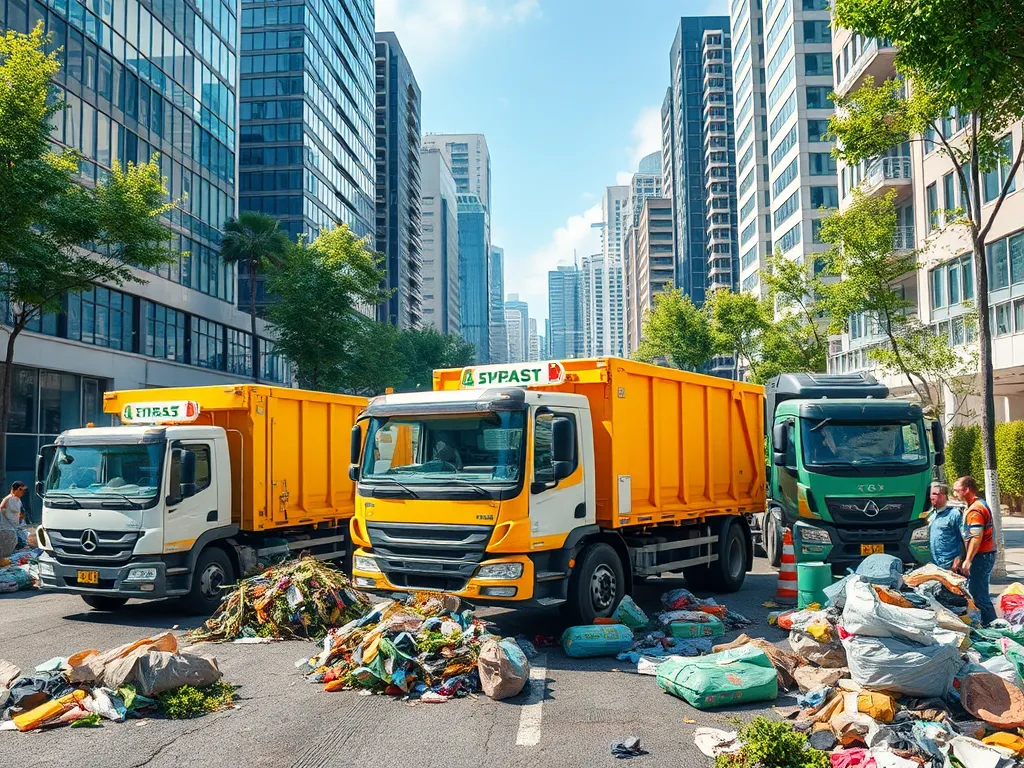Explore Latest Trends in the Junk Removal Industry

Trends in the Junk Removal Industry: A Comprehensive Analysis
The junk removal industry has experienced significant transformations in recent years, reflecting changing consumer behaviors, technological advancements, and heightened environmental concerns. Trends in the junk removal industry showcase a dynamic marketplace where convenience and consciousness lead the charge, as both businesses and consumers adapt to the evolving landscape.
One of the most notable Trends in junk removal industry is the integration of technology into service offerings. Companies are leveraging various tech solutions to enhance operational efficiencies and improve customer experience. From mobile applications that simplify booking procedures to the use of artificial intelligence (AI) for sorting and managing waste materials, technology is reshaping how junk removal services are delivered and perceived.
In addition to technology, eco-friendly practices have taken center stage within the Trends in junk removal industry. As awareness about environmental sustainability grows, both consumers and businesses are increasingly prioritizing methods that reduce ecological footprints. Companies that employ sustainable waste disposal methods, recycling initiatives, and upcycling projects are emerging as leaders in this sector, appealing to a clientele keen on making environmentally responsible choices.
Market growth and industry trends have also been pivotal in shaping the junk removal landscape. The increasing rate of urbanization has led to greater demand for junk removal services as densely populated areas generate more waste. Concurrently, a surge in consumer interest in decluttering and minimalist living is driving the need for professional junk removal services, marking a shift towards more organized and purposeful living environments. These dual phenomena are expanding the market for junk removal services significantly.
Regulatory changes are yet another critical factor impacting the junk removal industry. New regulations aimed at enhancing waste management practices are being implemented at various levels of government. As companies strive for compliance, they are developing strategies that not only meet regulatory requirements but also bolster operational credibility and attract eco-conscious clients.
The latest advancements in sustainable practices are highlighted by industry leaders like NREP, shaping the future of waste management.
Technology Integration in Junk Removal
A standout trend in the junk removal industry is the use of artificial intelligence (AI) technologies to streamline the sorting process of collected materials. AI-powered tools can efficiently identify recyclable items and categorize waste, minimizing manual labor and maximizing recycling rates. This technology adoption not only optimizes the junk removal workflow but also supports environmentally sustainable practices by ensuring more materials are recycled rather than sent to landfills.
Innovative mobile applications have also emerged to facilitate easier booking of junk removal services. Customers can now schedule pickups, receive quotes, and track their service provider's arrival times all from the convenience of their smartphones. This seamless and user-friendly experience meets growing consumer expectations for fast and efficient service, catering to a more tech-savvy demographic.
Moreover, junk removal companies are implementing sophisticated tracking and management systems to enhance their operations. By utilizing software solutions that monitor work orders, track inventory, and manage routes, businesses can reduce operational costs and improve service delivery. These systems ensure that companies can efficiently allocate resources, respond to customer requests promptly, and maintain high levels of service quality in a competitive market.
Eco-Friendly Practices
Sustainability is at the forefront of Trends in junk removal industry, with many companies adopting sustainable disposal methods for waste materials. Practices such as donating usable items, recycling components, and properly disposing of hazardous waste are becoming standard procedures among industry leaders. This commitment to sustainability reinforces their brand image and engages environmentally-conscious consumers.
Recycling trends have also made a significant impact in the junk removal business. Many companies are now focused on maximizing recycling rates by combining junk removal services with robust recycling programs that ensure materials are processed in an eco-friendly manner. By promoting these recycling initiatives, companies can attract a clientele motivated by sustainability and a desire to minimize their impact on the planet.
The rise of upcycling initiatives also plays a vital role in the evolution of junk removal practices. Upcycling, which involves transforming discarded materials into valuable new products, is gaining traction as creatives and consumers alike seek to repurpose old items rather than dispose of them. Companies that incorporate upcycling initiatives into their services not only differentiate themselves in a crowded market but also engage clients who are passionate about sustainability and innovative reuse solutions.
Market Growth and Trends
The junk removal industry has witnessed a surge in market size and growth rates, fueled by an uptick in consumer demand for organized living spaces. As people increasingly recognize the benefits of removing clutter from their homes and work environments, the need for professional junk removal services has never been greater, positioning this industry for ongoing expansion.
Urbanization plays a crucial role in the growth of junk removal needs. As cities become more densely populated, the amount of generated waste continues to rise. This surge has prompted both residents and businesses to seek efficient junk removal solutions to manage increasing waste levels, thus boosting the industry significantly as it adapts to these demands.
Consumer trends such as minimalism and decluttering are accelerating the demand for junk removal services. A more conscious approach to possessions is pushing individuals to seek assistance in reducing the accumulation of items, presenting junk removal companies with ample opportunities for growth as they become trusted partners in achieving these decluttering goals.
Regulatory Changes
Recent regulatory changes have reshaped the fabric of the junk removal industry. New laws and guidelines aimed at improving waste management practices are being introduced, requiring junk removal companies to adapt and comply with these standards. Businesses that embrace these regulations not only position themselves as responsible operators but may also gain a competitive edge in an increasingly environmentally aware market.
To navigate these regulatory changes, junk removal companies are developing compliance strategies that align with local and national regulations. By investing in employee training, updating operational practices, and maintaining transparency with customers, businesses can ensure adherence to waste management laws while enhancing their reputation as responsible service providers.
Local governments also play a pivotal role in shaping the junk removal landscape. As they initiate policies focused on waste reduction, recycling, and sustainable waste management, junk removal companies are encouraged to comply and innovate. By collaborating with local governments on initiatives or participating in community programs, companies can strengthen their position while contributing positively to waste management efforts.
Customer Preferences and Behavior
A significant shift in customer expectations has emerged within the junk removal industry, with consumers seeking more transparent, reliable, and customer-centric services. Modern consumers are not only looking for quick solutions but also appreciate clear communication, ethical practices, and efficient service delivery. As such, junk removal companies are adjusting their business models to meet these evolving preferences.
The importance of online reviews has skyrocketed in the junk removal sector, influencing customers' choices when selecting service providers. With platforms like Google, Yelp, and social media shaping public perceptions, businesses are increasingly motivated to maintain high service standards and engage positively with customers. Building a solid online reputation is essential for attracting and retaining clients in this digital age.
Emerging demographics, including younger generations like Millennials and Gen Z, are bringing fresh perspectives and approaches to junk removal. These groups tend to prioritize sustainability, convenience, and innovation, fostering an environment where junk removal companies must adapt their services and marketing strategies to resonate with these consumers. Understanding these demographic shifts is crucial for industry players seeking to thrive in an ever-evolving marketplace.
